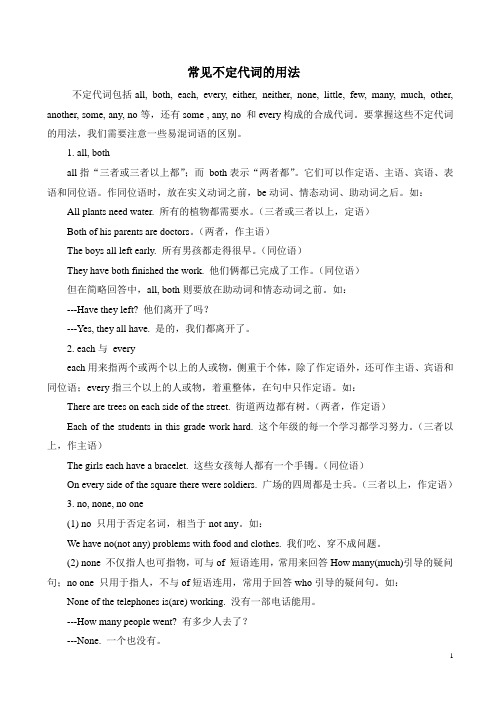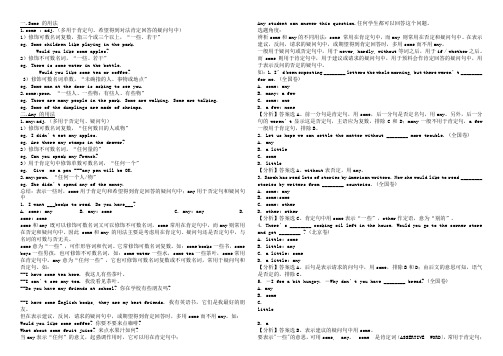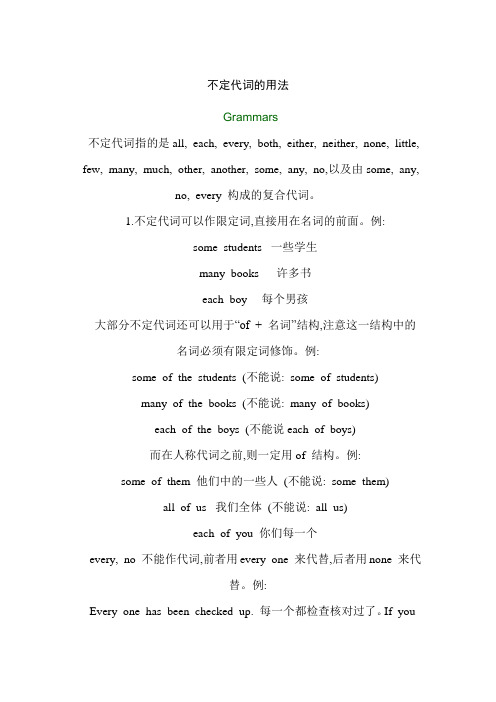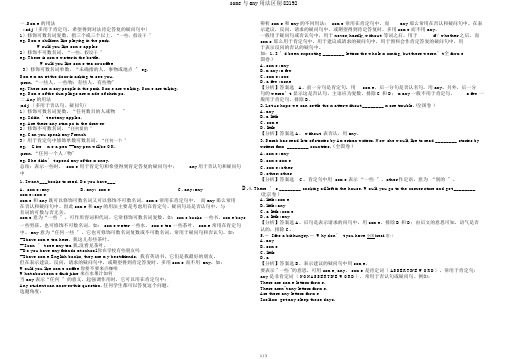3)some,any,many,_few_等区别
常见不定代词的用法

常见不定代词的用法不定代词包括all, both, each, every, either, neither, none, little, few, many, much, other, another, some, any, no等,还有some , any, no 和every构成的合成代词。
要掌握这些不定代词的用法,我们需要注意一些易混词语的区别。
1. all, bothall指“三者或三者以上都”;而both表示“两者都”。
它们可以作定语、主语、宾语、表语和同位语。
作同位语时,放在实义动词之前,be动词、情态动词、助动词之后。
如:All plants need water. 所有的植物都需要水。
(三者或三者以上,定语)Both of his parents are doctors。
(两者,作主语)The boys all left early. 所有男孩都走得很早。
(同位语)They have both finished the work. 他们俩都已完成了工作。
(同位语)但在简略回答中,all, both则要放在助动词和情态动词之前。
如:---Have they left? 他们离开了吗?---Yes, they all have. 是的,我们都离开了。
2. each与everyeach用来指两个或两个以上的人或物,侧重于个体,除了作定语外,还可作主语、宾语和同位语;every指三个以上的人或物,着重整体,在句中只作定语。
如:There are trees on each side of the street. 街道两边都有树。
(两者,作定语)Each of the students in this grade work hard. 这个年级的每一个学习都学习努力。
(三者以上,作主语)The girls each have a bracelet. 这些女孩每人都有一个手镯。
(同位语)On every side of the square there were soldiers. 广场的四周都是士兵。
must与have_to的区别。many、much、some、any、a_lot_of、a_few、a_little的区别

一、must、have (got)to的区别1、must (情态动词)必须,一定要。
表示主观的义务和必要,主要用于肯定句和疑问句中。
由must引起的疑问句,肯定回答用must或have to,否定回答用needn’t或don’t have to,意思为‘不必,不需要’。
mustn’t表示禁止,‘不能,不许’。
--You must see the doctor, Joe. You don’t look very well.--You mustn’t play with fire, you may burn yourself.--Must I clean the window now? --No, you needn’t.Must也可以表示肯定的猜测,常用于肯定句中,意思为‘一定是,必然’。
--Your sister must be a doctor in this hospital.--It must have rained last night, for the ground is wet.--Harry has been reading all day, and he must be tired.2、have to 与 have got to 常可以互换,‘不得不,不得已,必须’,是一种客观的需要,属于被动情况。
否定形式是don’t have to,相当于needn’t。
--My mother is out, so I have (got) to look after the shop.--Jack’s ill, so they have got to change their plans.--They don’t have to buy a computer at present.另外,must没有时态的变化,过去时或将来时必须用have (got) to--I must go to Shanghai today.--I have to go to Shanghai tomorrow.3、have got 意思为‘拥有’,相当于have,常用于口语中。
some与any的用法区别

一.Some 的用法1.some : adj.(多用于肯定句、希望得到对法肯定回答的疑问句中)1)修饰可数名词复数,指三个或三个以上,“一些、若干”eg. Some children like playing in the park.Would you like some apples?2)修饰不可数名词,“一些、若干”eg. There is some water in the bottle.Would you like some tea or coffee?3)修饰可数名词单数,“未确指的人、事物或地点”eg. Some man at the door is asking to see you.2.some:pron. “一些人、一些物;有些人、有些物”eg. There are many people in the park. Some are walking. Some are talking.eg. Some of the dumplings are made of shrimps.二.Any 的用法1.any:adj.(多用于否定句、疑问句)1)修饰可数名词复数,“任何数目的人或物”eg. I didn’t eat any apples.eg. Are there any stamps in the drawer?2)修饰不可数名词,“任何量的”eg. Can you speak any French?3)用于肯定句中修饰单数可数名词,“任何一个”eg. Give me a pen ---any pen will be OK.2.any:pron. “任何一个人/物”eg. She didn’t spend any of the money.总结:表示一些时,some用于肯定句和希望得到肯定回答的疑问句中;any用于否定句和疑问句中1. I want ___books to read. Do you have___?A. some; anyB. any; someC. any; anyD. some; somesome和any 既可以修饰可数名词又可以修饰不可数名词,some常用在肯定句中,而any则常用在否定和疑问句中。
some和any的区别和用法

some 和any 的区别和用法要表示"一些"的意思,可用some, any 。
some 是肯定词(ASSERTIVE WORD 〕,常用于肯定句;any 是非肯定词(NONASSERTIVE WORD 〕,常用于否定句或疑问句。
例如:There are some letters for me.There aren''t any letters for me.Are there any letters for me?I seldom get any sleep these days.any 也常用于条件分句以及带有否定含义的句子中:If you have any trouble, please let me know. 如果你有任何麻烦,请让我知道。
I forgot to ask for any change. 我忘了要一些零钱。
当说话人期待肯定回答时,some 也可用于疑问句, 比如当说话人期待来信时,他可以问道:Are there some letters for me?当购物时向售货员提问或者主人向客人表示款待时,也可在疑问句中用some:some 和any 既可以修饰可数名词又可以修饰不可数名词,some 常用在肯定句中,而any 则常用在否定和疑问句中。
因此 some 和any 的用法主要是考虑用在肯定句、疑问句还是否定句中,与名词的可数与否无关。
some 意为“一些”,可作形容词和代词。
它常修饰可数名词复数。
如:some books 一些书,some boys 一些男孩,也可修饰不可数名词,如:some water 一些水,some tea 一些茶叶,some 常用在肯定句中。
any 意为“任何一些”,它也可修饰可数名词复数或不可数名词,常用于疑问句和否定句。
如:--I have some tea here. 我这儿有些茶叶。
--I can’t see any tea. 我没看见茶叶。
不定代词的用法

不定代词的用法Grammars不定代词指的是all, each, every, both, either, neither, none, little, few, many, much, other, another, some, any, no,以及由some, any,no, every 构成的复合代词。
1.不定代词可以作限定词,直接用在名词的前面。
例:some students 一些学生many books 许多书each boy 每个男孩大部分不定代词还可以用于“of + 名词”结构,注意这一结构中的名词必须有限定词修饰。
例:some of the students (不能说: some of students)many of the books (不能说: many of books)each of the boys (不能说each of boys)而在人称代词之前,则一定用of 结构。
例:some of them 他们中的一些人(不能说: some them)all of us 我们全体(不能说: all us)each of you 你们每一个every, no 不能作代词,前者用every one 来代替,后者用none 来代替。
例:Every one has been checked up. 每一个都检查核对过了。
If youneed a repairman, there's none better than my brother.如果你需要一位修理工,没有谁比我的弟弟更好的了。
everyone/everybody 之后不接of短语,而every one 之后接of 短语。
例:Every one of us was surprised to hear the news. 我们每一个人听了这个消息后都很惊奇。
all 或both 后接of短语时,of 常常省去。
例:all (of) my friends 我的所有朋友both (of) Tom's friends 汤姆的两个朋友2.little 和few 都可以作代词和限定词用,little 用来指不可数的事物或修饰不可数的事物;而few 则用来指可数的事物(人)或修饰可数的事物(人)。
some 和any 的用法

02
some 和any 在肯定句中的用法
some 的用法
some 用于肯定句中表示“一些”,可以修饰可数名 词或不可数名词。
some 用于表示建议、请求或希望得到肯定回答时, 常用于肯定句中。
some 也可以用于表示“某个”、“某些”的意思, 此时用于特指某些人或事物。
any 的用法
any 用于肯定句中表示“任何一些”、“任何一个”,可以修饰可数名词或不可数 名词。
01
03
some 用于肯定句中,表示“一些”。 some 可以修饰可数名词或不可数名词。 some 用于表示建议、请求或希望得到肯定回答。
any 的含义
any 用于否定句和疑问句中, 表示“一些”。
any 可以修饰可数名词或不可 数名词。
any 用于表示建议、请求或希 望得到肯定回答时,通常用于 否定句。
some 和 all
当表示“所有”时,some 和 all 可以互换使用。例如, “All of the students passed the exam.”(所有学 生都通过了考试。)
some 和 none
在表示“没有任何人或物”时,some 和 none 可以 互换使用。例如,“None of the apples are ripe.” (没有一个苹果是熟的。)
03
some 和 either
在表示“两个中的任何一个”时,some 和 either 可以互换使用。例
如,“I will either go to the movies or stay home.”(我要么去看
电影,要么呆在家里。)
some 和any 的其他特殊用法
some 和 none
在表示“没有任何人或物”时,some 和 none 可以 互换使用。例如,“None of the students passed the exam.”(没有学生通过考试。)
不定代词重要考点

不定代词Presentation重要考点1.some和any初一学习中some一般用于肯定句中,any一般用于否定句、疑问句和条件从句中,在句中作定语,修饰可数名词,也可以是不可数名词;Eg: Sue buys some cake for you.Sandy doesn’t want any beans.在表示请求和邀请时,some也可以用在疑问句中,例如:Can I have some milk?(请求)Would you like some cakes?(邀请)新考点some (一些,某些,某个)用作不定代词在肯定句中作主语、宾语、定语等。
Some are bus drivers,others are bus conductors.Do you have any French books?-yes, I have some.(宾语)I have read that in some magazine.(定语,修饰可数名词单数,翻译为某一本)不定代词any用在肯定句中时,意思是“任何的”。
如:You may come at any time;I'll be in the office the whole morning.She is younger than any other comrade in the workshop.You must find a dictionary,any dictionary will do..1.Would you like______more?2.There are some apples on the table. You can take______of them.指两者和三者的不定代词2. Each 和every一同:后接单数名词,谓语动词均须用单数四异:(1)each指两个或两个以上中的一个;而every指三个或以上中的一个。
( 2 )each可单独使用、做定语时后面的名词要用单数;而every不可单独使用,后面必须加名词(只能在句中做定语),名词用单数。
some与any用法区别82192

一 .Some 的用法: adj.〔多用于肯定句、希望得到对法肯定答复的疑问句中〕 1〕修饰可数名词复数,指三个或三个以上,“一些、假设干 〞 eg. Some children like playing in the park.Would you like some apples2〕修饰不可数名词,“一些、假设干 〞 eg. There is some water in the bottle.Would you like some tea or coffee3〕修饰可数名词单数,“未确指的人、事物或地点 〞 eg. Some man at the door is asking to see you. :pron. “一些人、一些物;有些人、有些物〞eg. There are many people in the park. Some are walking. Some are talking. eg. Some of the dumplings are made of shrimps. 二 .Any 的用法:adj. 〔多用于否认句、疑问句〕1〕修饰可数名词复数,“任何数目的人或物 〞 eg. I didn ’t eat any apples.eg. Are there any stamps in the drawer 2〕修饰不可数名词,“任何量的 〞 eg. Can you speak any French3〕用于肯定句中修饰单数可数名词,“任何一个 〞 eg. Give me a pen ---any pen will be OK.辨析 some 和 any 的不同用法: some 常用在肯定句中,而 any 那么常用在否认和疑问句中。
在表示建议,反问,请求的疑问句中,或期望得到肯定答复时,多用some 而不用 any 。
一般用于疑问句或否认句中,用于never, hardly, without 等词之后,用于 if / whether 之后。
- 1、下载文档前请自行甄别文档内容的完整性,平台不提供额外的编辑、内容补充、找答案等附加服务。
- 2、"仅部分预览"的文档,不可在线预览部分如存在完整性等问题,可反馈申请退款(可完整预览的文档不适用该条件!)。
- 3、如文档侵犯您的权益,请联系客服反馈,我们会尽快为您处理(人工客服工作时间:9:00-18:30)。
some,any,many; a few; few等的区别
(1)some 用于肯定句,表示可数名词和不可数名词。
例如:
There is some water in this glass.
(2)any多用于疑问句,否定句和条件状语从句,可以接可数名词和不可数名词。
例如:She doesn’t have any money.
If I see any good luck, I’ll tell you.
(3) many; a few; few用于可数名词复数前,可以用在肯定句、否定句、疑问句当中。
例如:
I have few friends in Shanghai.
(4)但many a用于可数名词单数前。
例如:
Many a boy learns to swim before he can read.
(5)much;a little;little用于不可数名词前,可以用在肯定句、否定句、疑问句当中。
例如:
There isn't much tea, but we only need a little for a cup of tea.
a lot of, 相当于much,more的化身,但仅用于修饰名词,当后面接形容词比较级时,应为a lot;例:
There is a lot of water in the tank; There'are a lot of books in my room; I'm a lot better now, thanks.
more, 为much和many的比较级,后接名词(可数或不可数均可),或形容词;例:
I have more books than him. I have more coffee than him; The book is more expensive.
plenty of稍微复杂一点,用于口语表达时修饰不可数名词的程度而非数量多一些,但它也可以修饰可数名词,
只是情况稍少些;
a little, a few就没什么好说了吧,"一些",分别接不可数、形容词和可数名词~例:
I have a little money; I'm a little hungry;I have a few books。
a little, a few:一些。
a little形容不可数名词、形容词和a few形容可数名词。
例:
I have a little money; I'm a little hungry;I have a few books。
little, few,指几乎没有,little形容不可数名词,few形容可数名词
plenty of稍微复杂一点,用于口语表达时修饰不可数名词的程度而非数量多一些,但它也可以修饰可数名词,
只是情况稍少些
a lot of, 相当于much,more的化身,但仅用于修饰名词,当后面接形容词比较级时,应为a lot;例: There is a lot of water in the tank; There'are a lot of books in my room; I'm a lot better now, thanks.。
